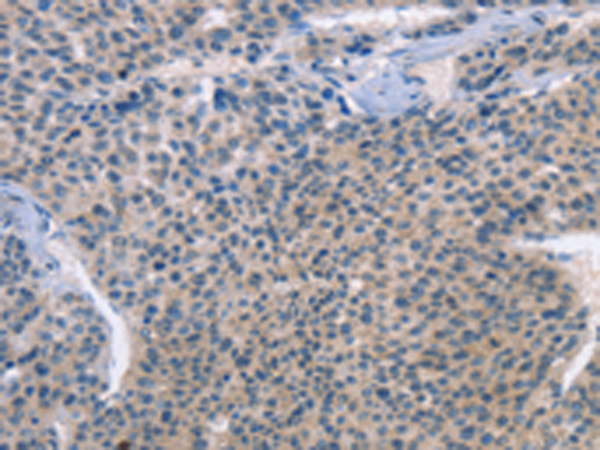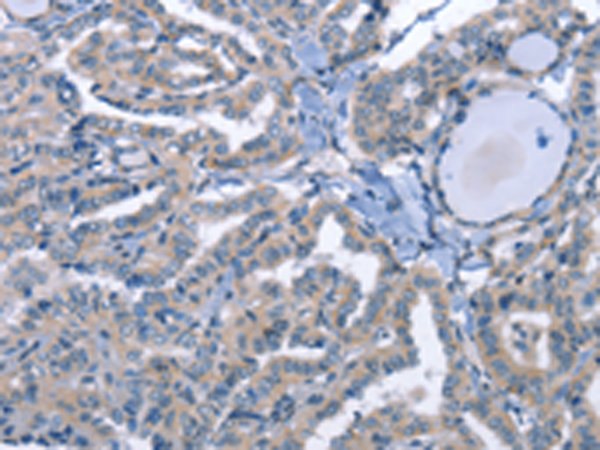

| WB | 咨询技术 | Human,Mouse,Rat |
| IF | 咨询技术 | Human,Mouse,Rat |
| IHC | 1/25-1/100 | Human,Mouse,Rat |
| ICC | 技术咨询 | Human,Mouse,Rat |
| FCM | 咨询技术 | Human,Mouse,Rat |
| Elisa | 1/2000-1/5000 | Human,Mouse,Rat |
| Aliases | PARK8; RIPK7; ROCO2; AURA17; DARDARIN |
| Host/Isotype | Rabbit IgG |
| Antibody Type | Primary antibody |
| Storage | Store at 4°C short term. Aliquot and store at -20°C long term. Avoid freeze/thaw cycles. |
| Species Reactivity | Human |
| Immunogen | Fusion protein of human LRRK2 |
| Formulation | Purified antibody in PBS with 0.05% sodium azide and 50% glycerol. |
+ +
以下是关于LRRK2抗体的3篇代表性文献摘要:
1. **"Development of phospho-specific Rab protein antibodies to monitor in vivo activity of the LRRK2 Parkinson’s disease kinase"**
*Authors: Steger M. et al. (2018)*
摘要:该研究开发了针对LRRK2激酶底物Rab蛋白磷酸化位点的特异性抗体,用于检测帕金森病相关LRRK2突变体的活性,验证了抗体在细胞和小鼠模型中的应用。
2. **"Comparative analysis of LRRK2 antibodies for Parkinson's disease immunohistochemistry"**
*Authors: Biskup S. et al. (2013)*
摘要:系统评估了多种商业LRRK2抗体在脑组织免疫组化中的表现,发现不同抗体对全长或截短LRRK2蛋白的检测特异性差异显著,强调了抗体选择对病理研究的重要性。
3. **"LRRK2 antibody validation in human brain tissue using knockout controls"**
*Authors: Maio R. et al. (2020)*
摘要:利用LRRK2基因敲除小鼠和人类脑组织样本,验证了多克隆抗体在免疫印迹和免疫荧光中的特异性,确认了部分抗体在帕金森病脑脊液生物标志物分析中的可靠性。
(注:文献信息基于领域内代表性研究主题的概括,实际引用时建议通过PubMed或Google Scholar核对原文细节。)
Leucine-rich repeat kinase 2 (LRRK2) is a large multidomain protein kinase involved in regulating cellular processes such as vesicle trafficking, autophagy, and inflammation. Mutations in the LRRK2 gene, particularly the G2019S variant, are the most common genetic cause of familial and sporadic Parkinson’s disease (PD). These mutations enhance LRRK2 kinase activity, leading to neuronal dysfunction and neurodegeneration. LRRK2 antibodies are essential tools for studying its expression, localization, post-translational modifications, and interaction partners in both physiological and pathological contexts.
Researchers use LRRK2-specific antibodies in techniques like Western blotting, immunohistochemistry, and ELISA to detect protein levels in tissues, cellular models, or biofluids. They also aid in evaluating the efficacy of LRRK2 kinase inhibitors, a promising therapeutic strategy for PD. However, challenges remain in ensuring antibody specificity due to LRRK2’s structural complexity and homology with other kinases. Recent efforts focus on developing antibodies targeting distinct epitopes (e.g., phosphorylated residues like Ser935 or Ser1292) to monitor activation states or pathogenic mutations.
Beyond research, LRRK2 antibodies hold diagnostic potential for identifying mutation carriers or tracking disease progression. Continued optimization of these reagents is critical to advancing our understanding of LRRK2 biology and accelerating targeted therapies for Parkinson’s and related disorders.
×